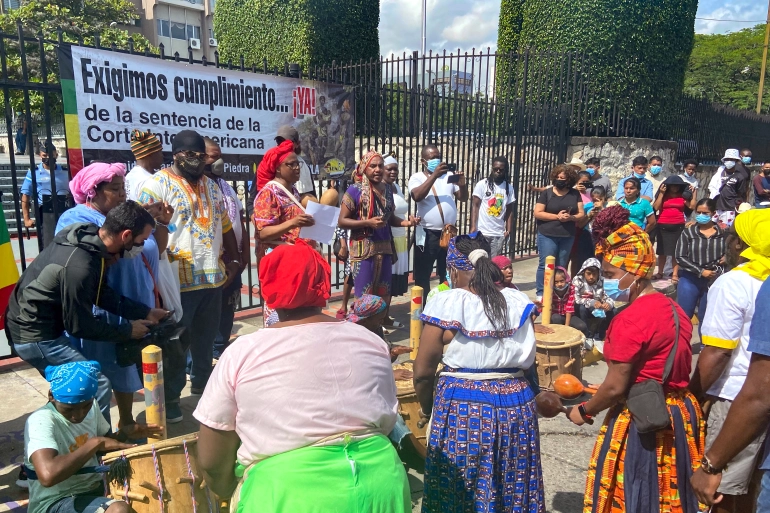Honduras. After more than a decade of post-coup rule that made Honduras one of the most dangerous countries in the world for land defenders, President Xiomara Castro promised to usher in policies to support historically persecuted groups, including the Afro-Honduran Garifuna people.
Now, protesters are pressuring Castro to keep her promises, which include facilitating “binding dialogues with all Indigenous and Afro-descendant peoples” and ensuring “the protection of their territories, languages and cultures”.
The country’s Afro-Honduran population has long had to fend off intrusive tourism developers, palm oil plantations, and organised crime syndicates vying for a piece of their pristine land along the Caribbean coast. This has made them a constant target of violence, state surveillance and criminalisation.
During two major protests in Tegucigalpa last month, Garifuna leaders urged the government to investigate serious crimes, respect international rulings in support of their land rights, and create a new investigative unit for disappearances.
“We’re not going to continue in this dynamic of words and promises,” Rony Castillo, a protester with the grassroots Black Fraternal Organization of Honduras (OFRANEH), told Al Jazeera. “We’re going to demand that they show this political will through actions.”
Forced disappearances
Among those demands is a government inquiry into the unresolved disappearances of four Garifuna community leaders in Triunfo de la Cruz in July 2020. The community there has been fighting for its collective land rights, a battle buttressed seven years ago by a ruling from the Inter-American Court of Human Rights (IACHR). One of the missing men, Snider Centeno, was a prominent leader in this struggle.
Their abduction, reportedly carried out by individuals dressed in police uniforms, alarmed other local land defenders. In a petition presented to the Supreme Court on August 24, OFRANEH accused Honduran officials whose tenure dates back to the era of former President Juan Orlando Hernandez – now in the United States facing drug trafficking charges – of failing to carry out their duties to investigate and search for the disappeared men.
Castro’s government has promised to launch a new search. Manuel Zelaya, Castro’s husband and former president until he was deposed in a 2009 coup, said in August: “The Garifunas, whether kidnapped or sacrificed by the previous regime, must appear. We have the right to know where they are.”
Cesar Benedict, a Garifuna leader from Triunfo de la Cruz and close friend of Centeno, told Al Jazeera the comments were encouraging. “I have a lot of hope that this government is going to work differently with the Garifuna people, and that we will have an answer about our companions.”
Other members of the Garifuna community, however, have been more critical. After a video circulated on social media of Zelaya chastising an Indigenous Lenca leader for “not understanding” why a highway could not be built, the Assembly of Women Fighters advocacy group accused him of “referring in a mocking tone to their spirituality and worldview, with contempt for their way of seeing the world”.
‘The same or worse’
Two years after the disappearances and seven months since the Castro government took office, many Garifuna leaders are demanding more than just government speeches.
Castillo has called on the Honduran government to respect various IACHR rulings that recognise Garifuna communities’ rights to their land, including a 2006 decision that favoured the community of San Juan, which the government has failed to enforce.
Miriam Miranda, coordinator of OFRANEH, described the Castro administration’s stance on the resolution as “the same or worse” than the previous regime.
On the case of the disappeared Garifunas, a spokesperson for the Honduran attorney general’s office told Al Jazeera that it was awaiting a final report from the Investigative Police Directorate before it could move forward. Honduran police did not respond to a request for comment.
OFRANEH is also urging the attorney general’s office to create a special unit to investigate enforced disappearances, similar to those established in other Latin American countries, such as Mexico and El Salvador. Spurred on by the “emblematic event of the young Garifunas”, such a unit could also push the state to investigate other disappearances, Castillo said.
Honeymoon period fading
Meanwhile, tensions have been continuing to build between the state and Garifuna activists.
After a protest on August 9, Honduran authorities accused protesters of entering the building housing the attorney general’s office by force – an allegation protesters deny. OFRANEH has denounced the state’s subsequent decision to open an investigation into several of its members, including Miranda.
“No more can we allow them to persecute our leaders, while the criminals who rob this country and have left us in disgrace are set free,” Miranda told reporters at the Supreme Court on August 24.
The Castro government has often pointed to the pilfered public funds and shattered institutions left by the previous administration as the main obstacles to carrying out its plans. But Miranda criticised this framing. “Not everything is going to be solved with money,” she told Al Jazeera.
“There are things that this government should do, not just thinking about having the money to do it, but about making decisions to at least give hope to this country, to the Honduran people, who voted for Xiomara Castro in an act of frustration but also of hope.”
Despite some initial goodwill towards the left-wing candidate who rose to prominence protesting against her husband’s removal, the protests might suggest that Castro’s honeymoon period is coming to an end.
“OFRANEH didn’t rest one single day during the 12 years of dictatorship, and we think it’s important that the rights of the Garifuna people are respected,” Miranda said. “We’re going to continue.”
Source: Aljazeera.




































[…] source […]